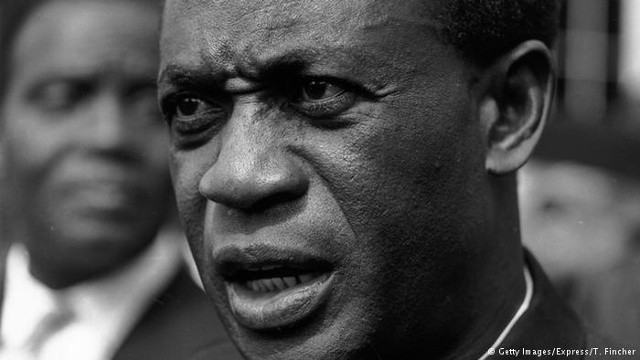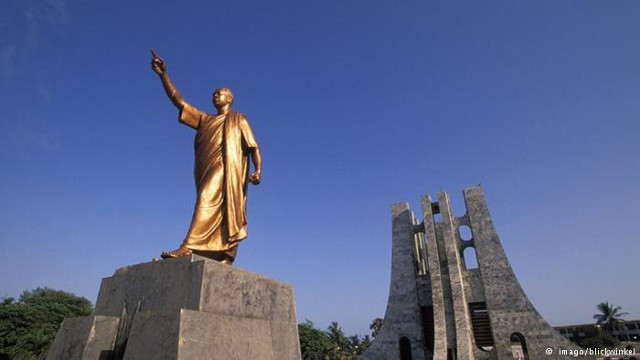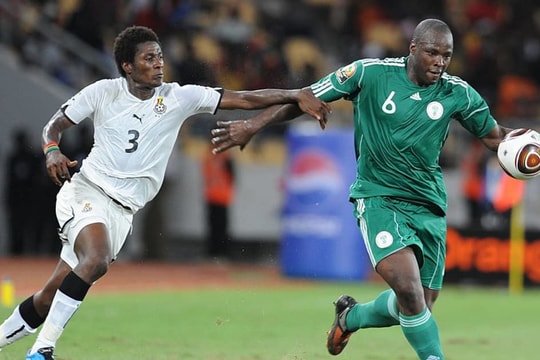Portrait of Ghana's first President
(Baonghean) - Ghana's first president, Kwame Nkrumah, was overthrown in a coup 50 years ago. His ambitions to turn the country into a modern industrialized economy and unify Africa did not come true, but people still respect and remember him as a visionary leader and national hero of Ghana.
Nkrumah was born into a family of goldsmiths on September 21, 1909, in the Gold Coast, one of the former British colonies. During his childhood, Nkrumah attended a Catholic school and later became a teacher for a time.
 |
| Portrait of Ghana's first President. Photo: Getty Images. |
Always harboring the dream of pursuing an education in the United States, the young Nkrumah, from a humble background, decided to find a way to cross the Atlantic to the land of the stars and stripes by boarding an ocean liner without paying his ticket. For the next 10 years, Nkrumah spent all his time living and studying in the world's leading power.
In the mid-1940s, Nkrumah moved to England and began studying law. There, he became a strong advocate of pan-Africanism, advocating a strong and united Africa.
In 1947, after many years abroad, he decided to return to his homeland of the Gold Coast, and soon organized strikes and protests, then founded the radical Congress People's Party (CPP) with the slogan "Independence Now".
In 1950, Nkrumah was arrested and imprisoned by the British. A year later, the CPP won the elections with an overwhelming majority. Nkrumah was released from prison and asked to form a government. He became Prime Minister in 1952, but ultimate power in the country remained in the hands of the British.
It was not until 1957, when the Gold Coast gained independence, that things began to change. Ghana declared itself a republic in 1960 and Nkrumah was quickly elected its first president. At that time, Ghana was the world’s largest cocoa exporter, but it lacked the factories and equipment to process its natural resources to the fullest.
President Nkrumah established many state-owned companies, built a large dam for hydroelectric power generation, built schools and universities, and supported liberation movements in African colonies that had not yet achieved independence.
 |
Now, Ghanaians can re-evaluate what went well and what didn't during Nkrumah's reign. Photo: Internet. |
He always considered himself a socialist and a Marxist, and fought tirelessly to achieve the vision of a united Africa with only one parliament. German political scientist Christian Kohrs said of Nkrumah: “Unlike other heads of state in Africa, Nkrumah’s main concern was really the national interest.”
Many people believe that politics was Nkrumah's whole life, he never smoked or drank alcohol, and when asked what he did to relieve stress, Nkrumah replied that he relaxed by working. Ghanaians, especially the poor and the lower classes, revered Nkrumah and saw him as a savior, writing songs and prayers in his praise.
However, during his time in office, Nkrumah's government tended to become more and more autocratic. In 1961, just one year after independence, he decided to issue regulations that allowed the government to detain people for up to five years without trial.
Meanwhile, the economy of the newly born country was not going well, many problems arose. Most of the 50 state-owned companies then operating were in a state of poor management and lost money. Many of Mr. Nkrumah's projects included the construction of large buildings to enhance national prestige, but once formed, they were rarely used.
He even built a vast conference complex in Accra that was intended to accommodate the future government of a united Africa. However, in 1963, the Organization of African Unity (OAU), the precursor to the African Union (AU), rejected Nkrumah's vision of pan-Africanism. The first AOU summit was held in Addis Abba, Ethiopia, not in Accra, Ghana.
Ghana's strength - cocoa exports - also fell into trouble. Cocoa prices on the market plummeted, forcing President Nkrumah to raise taxes. Some experts believe that Nkrumah's ambition to bring a new look to the country and the whole of Africa ended up hurting his reputation.
As political scientist Kohrs notes: “If you want to modernize a country, you have to convince the people to follow you. That is what President Nkrumah forgot to do. Nkrumah wanted Ghana to become a modern country, but he wanted it to happen too quickly.”
On February 24, 1966, the Ghanaian military attempted a coup while Nkrumah was on a state visit to China. The coup was successful, and Nkrumah later sought asylum in Guinea. In 1972, he died in Bucharest, Romania, after a long battle with cancer.
Today, in Ghana, there are still many statues of President Nkrumah scattered around, many streets bear his name, and his portrait also appears on postage stamps and banknotes. After many years, Ghanaians have the opportunity to look back at Nkrumah's time in office, evaluate what he did, what he did and what he did not do, in relation to the military and civilian governments that succeeded him. In all fairness, he is still a beloved political figure and is remembered by posterity as the national hero who liberated Ghana./.
Phu Binh
(According to DW)
| RELATED NEWS |
|---|


